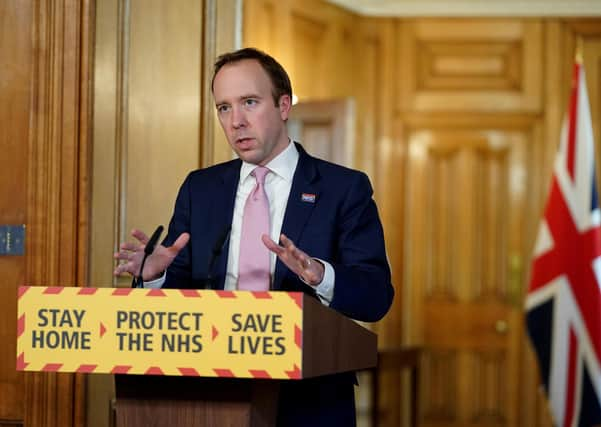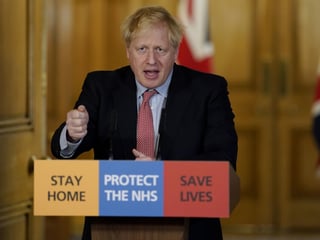Why Downing Street virus ‘blame game’ will be contagious – Matthew Flinders


The first is that there is going to be a baby boom around a year from now.
The second is that the baby boom is likely to be matched by a similarly spectacular increase in divorces (some couples will not have enjoyed spending so much time together).


Advertisement
Hide AdAdvertisement
Hide AdThe final confident prediction is that the ‘Covid crisis’ will lead to an outbreak of divisive and disruptive political blame games as politicians, policy-makers, advisers and experts all seek to avoid carrying the can for those decisions – or opinions – that inevitably turned out to be wrong.
Forget about herd immunity, social distancing and flattening curves, the likelihood is that fighting the crisis is likely to be matched by a parallel strategy that revolves around political immunity, blame-distancing and flattening out the public’s (and media’s) demand for a scalp when crisis-fatigue sets in. Social solidarity will turn into scapegoating, respect into recriminations and fear into frustration.
Cracks that will eventually grow into political chasms (into which some politicians will fall, others will be pushed and others will avoid only to continue their careers in the shadow of the crisis) are already beginning to show – such as briefings against Matt Hancock, the Health and Social Care Secretary, as Prime Minister Boris Johnson was being admitted to hospital with coronavirus.
To some extent this is inevitable. As the country heads towards what are likely to be the most intense and devastating weeks of the crisis, the pressure within Whitehall and Westminster is building up to levels that today’s generation of politicians and officials have simply never experienced.


Advertisement
Hide AdAdvertisement
Hide AdThe fact that several key players have gone down with symptoms of the virus has simply added to the pressure as working from home adds yet another level of complexity.
Internal discord is festering with regard to who should take responsibility for the flip-flopping strategy that took the country from a rather Cameroonian ‘chillax’ approach to sudden ‘lockdown’.
The existence of competing political agendas is beginning to grate and grind as territorial tensions become more obvious. Added to this are increasingly nervous questions about whether the time has come for even more restrictive measures.
Even now – at the very epicentre of the crisis – ministers and their special advisers, officials and their experts are thinking about who is going to ‘carry the can’ when the dust settles, the masks come off and the accountability industry kicks in. And kick in it will for the simple reason that in a low-trust high-blame adversarial polity like the UK’s, the nature of post-event scrutiny is rarely to undertake a level-headed, rational and constructive review of the evidence, but will instead focus on apportioning blame, heaping fault, finding scapegoats, pointing fingers and (ultimately) recommending resignations. In short, accountability is very much of the ‘Gotcha!’ variety.
Advertisement
Hide AdAdvertisement
Hide AdThe politics of pandemics tends to be associated with policy failure. This is a critical point. No matter what steps a government might take – or how quickly measures are put in place – the fact that, by its very existence, a pandemic brings with it crisis, and chaos intermixed with death and suffering ensures that any governmental response will be seen in generally critical terms.
And this brings me to my final point – a plea to those who will, at some point, review and report on the Government’s handling of the Covid crisis.
It’s very easy to blame and heckle from the sidelines when the war is won or the pandemic is passing; far harder to be the ‘man [or woman] in the arena’ charged with actually taking decisions and coping with complexity – as it were – ‘in the moment’.
It really isn’t the critic who counts. Building new hospitals, launching new policies, seeking new powers, liaising with other governments, co-ordinating a vast network of organisations, calming the public, reshaping the economy…and all on the basis of immediate need, divided expert opinion, the law of unintended consequences and in the knowledge that these are matters of life and death. Under-react, over-react; you are dammed if you do, dammed if you don’t, but it’s inevitable that things will go wrong.
Advertisement
Hide AdAdvertisement
Hide AdBut who will remember this, in the future, when the coronavirus blame games begin?
Matthew Flinders is Professor of Politics at the University of Sheffield. He is also Vice President of the Political Studies Association.
Editor’s note: first and foremost - and rarely have I written down these words with more sincerity - I hope this finds you well.
Almost certainly you are here because you value the quality and the integrity of the journalism produced by The Yorkshire Post’s journalists - almost all of which live alongside you in Yorkshire, spending the wages they earn with Yorkshire businesses - who last year took this title to the industry watchdog’s Most Trusted Newspaper in Britain accolade.
Advertisement
Hide AdAdvertisement
Hide AdAnd that is why I must make an urgent request of you: as advertising revenue declines, your support becomes evermore crucial to the maintenance of the journalistic standards expected of The Yorkshire Post. If you can, safely, please buy a paper or take up a subscription. We want to continue to make you proud of Yorkshire’s National Newspaper but we are going to need your help.
Postal subscription copies can be ordered by calling 0330 4030066 or by emailing [email protected]. Vouchers, to be exchanged at retail sales outlets - our newsagents need you, too - can be subscribed to by contacting subscriptions on 0330 1235950 or by visiting www.localsubsplus.co.uk where you should select The Yorkshire Post from the list of titles available.
If you want to help right now, download our tablet app from the App / Play Stores. Every contribution you make helps to provide this county with the best regional journalism in the country.
Sincerely. Thank you.
James Mitchinson
Editor
Comment Guidelines
National World encourages reader discussion on our stories. User feedback, insights and back-and-forth exchanges add a rich layer of context to reporting. Please review our Community Guidelines before commenting.
